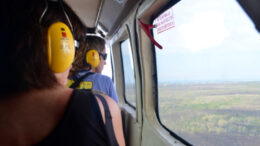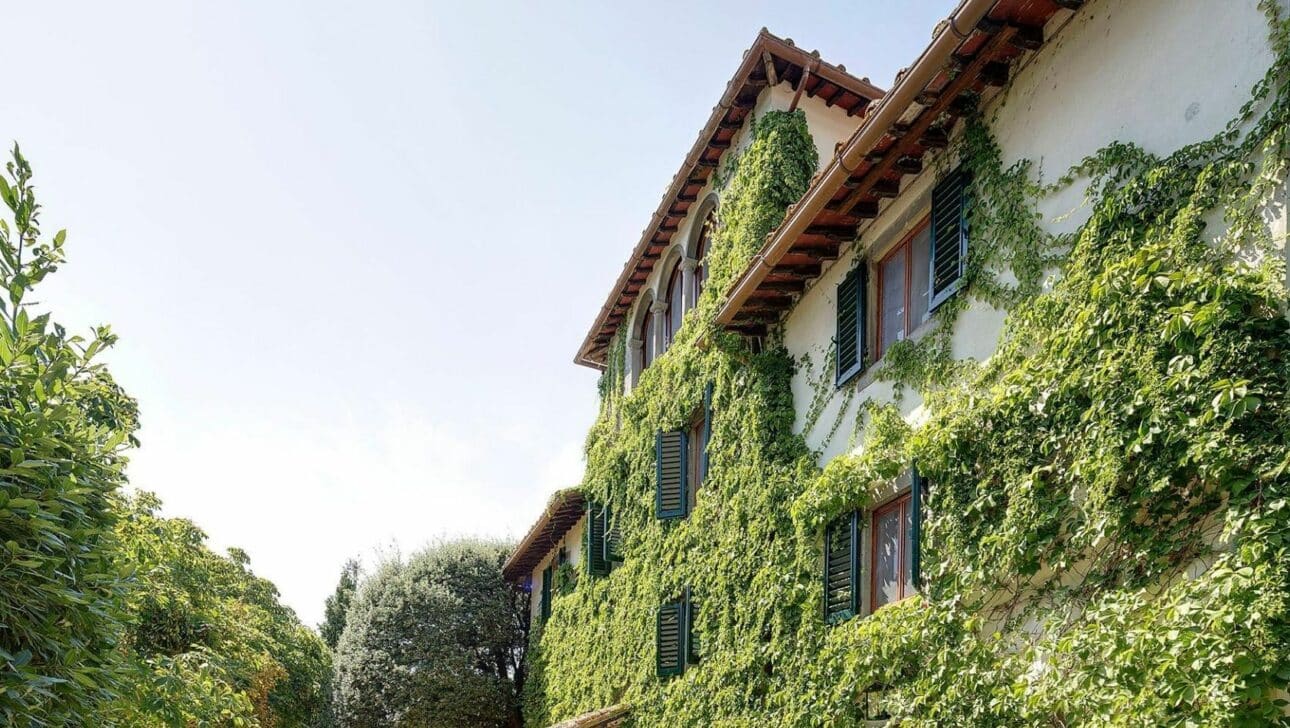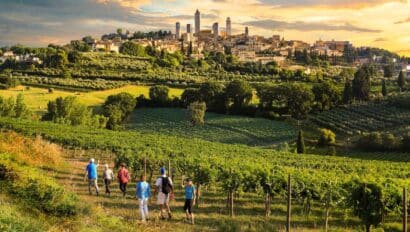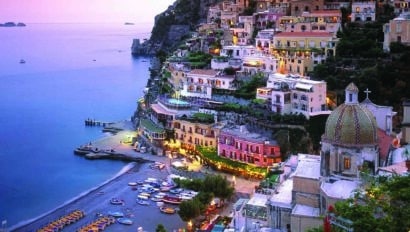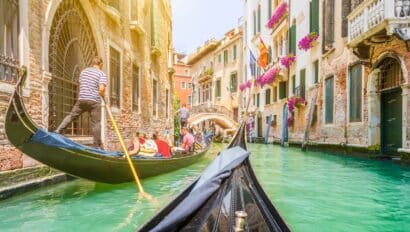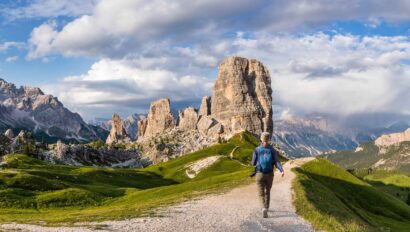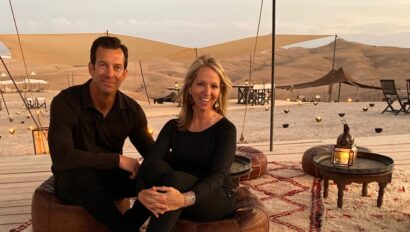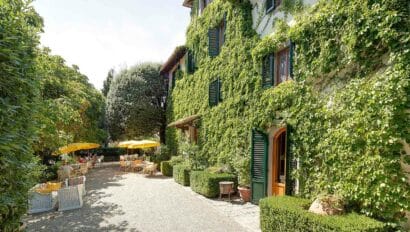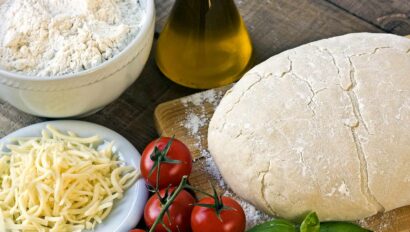Not all hoteliers can claim to be members of the Italian aristocracy… But at Chianti’s charming Villa la Barone, they can. Corso and Jacqueline—AKA Conte & Contessa Aloisi de Larderel—have been delighting Classic Journeys guests in their historic Tuscany hotel for over a decade.
With the help of our Tuscany tour guide, Luciano, and the wonders of the internet, our president and founder, Edward Piegza sat down for a Zoom catch up with Corso and Jacqueline.
Corso: We’re fine, we’re fine. Jacqueline is here.
Jacqueline: Hello!
Edward: Oh, I miss you guys so much!
Jacqueline: Well we miss you too!
Edward: Hi, this is Edward Piegza founder of Classic Journeys and I’m really thrilled to be here, interviewing and having a conversation with two very good friends of mine, Corso and Jacqueline, who are a real-life Count and Countess in Tuscany, Italy and the owners of a beautiful villa hotel, Villa Le Barone, that we feel very privileged to stay at on all of our trips in Tuscany.
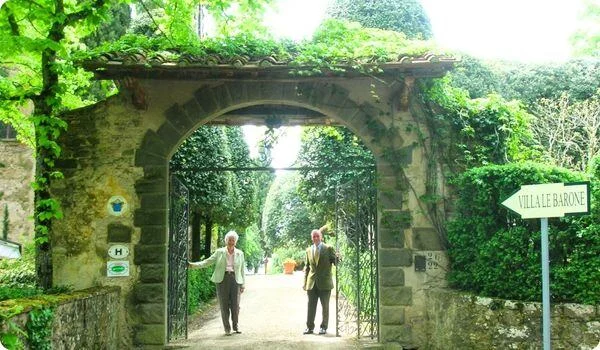
Welcome, and how does one become a Count or Countess?
Corso: Well, it was not very difficult Edward because I mean, I did that 76 years ago, when I was born! Just by tradition, just by family, I became a Count, which was not very painful!
I mean, what’s a Count? It’s just old families, whose titles come from the past. Nowadays the title doesn’t mean much. But we represent some kind of tradition, some kind of history, in which we’re a historical family who worked, who lived, who loved, in this lovely country of ours.
Edward: So, let’s talk about that for a moment. Because I think that for Americans, we would tend to look at a Count and Countess at a villa hotel in Tuscany, and we would think, oh, you’re connected to the land. And yet, you both have travelled extensively, and you’ve also lived in a lot of different places—including living in the US.
Can you talk a little bit about your background? I know Corso, you even went to university in the US. Can you guys talk a little bit about your background, before moving to Le Barone.
Corso: Well it’s easy enough yes, because my father was a diplomat, and so that meant I started my life going to Belguim, and then to Mexico, and then to Canada, and Guatemala, and Tunisia. And then I went to school when I was in my late teens/mid-teens. I went to Boston, to Boston College. And then after I graduated from there (in mathematics and physics,) I went to a school in Fontainebleau. And this is where I met Jacqueline, who had also travelled a lot (Jaqueline was in Yale).
Jacqueline: Yes, so coming back from Yale, where I was for one year on a scholarship, then we met, and we worked in Paris for quite a long time. And I was working also in General Electric, myself in the UN, and I travelled quite a lot for the UN, but each time I was coming back to Le Barone where our family were living. I was saying God, people who are living here, they don’t know how lucky they are! Because this is such a beautiful country, and Italians are so nice, so helpful, so welcoming.
Corso: Edward, people say here say here Tuscany, in Panzano, they say ‘we live in a happy island’.
Corso: Well, Le Barone had become a farm before it was a hotel (I hate the word ‘hotel’—we are not a hotel, we are a house open to friends.)
Edward: I agree.
Corso: But Le Barone has a very ancient history because it was a tower, to defend the good Florentines from the bad people from Sienna. You know, in Italy we always talk about history and in the middle ages, Sienna (which is a town 20 miles away,) was an enemy of Florence, (which was 20 miles in the opposite direction.)
Edward: I think of the various times that I’ve been at Le Barone, and I just think of how welcoming it is. It’s like this little personal intimate villa that you all have created.
You all were very much ahead of the 0 kilometer or the farm-to-table movement, before those became popular catchphrases. Do you think that traces back to you being the CEO of the environmental department at the UN in Geneva? Does it come because of your professional background? Does it come just because that’s the way you both like to eat? What’s the genesis for why everything has always been so local, local, local at Le Barone.
Jacqueline: Well, you know personally, when I was in Yale, it was the time when Rachel Carson had just written the Silent Spring. It was a time where so many accidents happened, in the US such as the Love Canal, but also in Europe. And so, this is why we care about the environment and here in Le Barone, you have food which is natural.
We have also a lot of flowers. When guests come here they find a bouquet of roses from the garden—or other types of flowers.
So, this is embedded, we can receive electric cars here and have had Teslas sometimes. We have some energy saving devices, some water saving devices, we are really proud of our environmental connections and sustainability connections.
Here, we cannot even change a window, because all the territory is protected. So, each room is different.
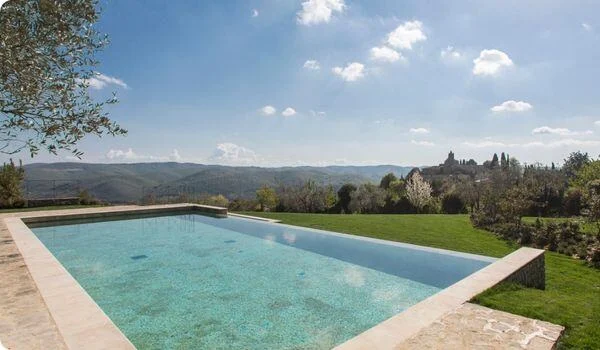
Corso: The furniture is all the original furniture, so we keep to history, we keep to tradition. We add comfort, of course but the main things are there.
Edward: Another thing that I’ve always noticed when I’m at Le Barone, is what a family atmosphere you’ve created with your team. And I think that comes from—and I’m interested to hear your thoughts on this, but observationally for me, it comes from—number, you both are on property, all of the time. I’ve never been at Le Barone where I haven’t seen you at breakfast, or at dinner, or both. Or, just you know, walking the gardens and chatting with the staff and with the guests. So people feel like they’re visiting family who happen to truly live at the villa.
And I also love that there are times where I’ll see Jaqueline in the afternoon and I’ll say, where’s Corso? And you’ll say, well, he’s out in the farm. He’s with the men working, putting down irrigation pipe or things like that. And then I’ll see Corso walking back and you’re wearing your wellingtons and you’re dirty from working in the farm for the day. And then an hour later I see you at dinner in a jacket, sitting with everyone having dinner. Do you think that—just truly in the spirit of Le Barone—that family atmosphere just came up organically because of the way in which you live your lives interacting with everyone, or is it from your time in management that you wanted to deliberately create that atmosphere?
Corso: It’s probably also a result of the past. I mean, in an old place like Le Barone, which was a farm, there would be the owners, there would be the people who managed the farm and there would be the people that worked on the farm. It was a kind of a large extended family, I mean, you knew who was the son of whom… you knew everyone’s families, and you kind of grew up together. In Le Barone as a hotel now, we’ve seen some people enter 17 years ago, we’ve seen them go up, from a young girl to a woman, a young man to a man, and it’s nice and we establish bonds. And this is what it is I mean, we are all kind of compounded together.
Jaqueline: It’s a family.
Corso: It’s a big family, you know.
Jacqueline: People are surprised to find the same staff members year after year. But for us its normal!
Corso: It starts with a capital G. It ends with an S. And it is—GUESTS!
Edward: That’s a great answer!
Corso: Really, it’s guests. We like them. We like to welcome them, and I mean they’re now part of our lives and we pamper them, and most of them become friends. Yes, so its guests that make our lives go on.
Jacqueline: It’s very nice to speak with guests. We learn from everyone. So that’s the first thing and the second thing is, as the French writer, Voltaire, said, “nothing can be done without a little bit of enthusiasm.”
Corso: Passion!
Jaqueline: Passion! So this is, you know, what we are.
Edward: I want to tell you both, we at Classic Journeys in the San Diego office feel extraordinarily fortunate for the family that we’ve developed around the world. And clearly, without a doubt, the relationship that we have with you both, and with your family, and your staff at Le Barone. It’s the perfect example of what we try to create everywhere in the world, which is this symbiotic relationship where the guests come first. I love that the guests come first for you guys, and the guests come first for us.
And I think that that’s why, when our team of guides, led by Luciano, who you mentioned, are bringing guests to Le Barone. It’s why they feel so welcome and so happy and why they want to return.
Edward: You’re going to need your arms wide open because we’re going to have a lot of guests coming with us! They may be in little micro groups, of a little family here, or two or three couples there. But I just know that they’re going to be wanting to come back to experience what you have and what we have enjoyed so much over so many years at Le Barone, which is just that incredible hospitality and just warmth and affection that you create there, at your beautiful happy little island.
Jacqueline: Thank you very much! They will have tranquility. They will have relaxation, hospitality, elegance (because we feel that we are an elegant hotel) and so again…
Corso: You forget something! You forget something Jaqueline!
Jacqueline: What did I forget?
Corso: Good food, and a glass of wine!
Jacqueline: Good food! But this is part of hospitality you know!
Edward: That’s very true! So, if we’re going to end with a toast with my coffee and your chianti. will you make a toast to the Classic Journeys guests for me?
Jacqueline: Oh yes!
Corso: Salute, to your health!
